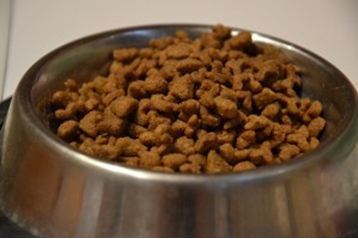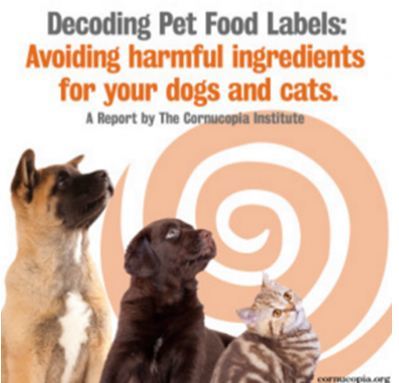Pet owners and scientists have now been concerned for several years as to what causes the consistent cases of digestive problems, tumors, and other chronic diseases in pets even at a young age. There have been growing concerns that the epidemic is somehow related to pet food.
If the leading health watchdog groups in the US are to be believed, pet food could actually be the culprit. According to a nonprofit, Cornucopia Institute’s latest report, scandalous ingredients have been found in a majority of commercially available pet foods.
The organization is engaged in the investigation of food and farming problems. The report has asked for avoiding these commercial toxic pet foods because they have GMOs, certain animal byproducts, and chemical compounds.
Most of the health issues faced by pets are similar to the ones seen in the research studies involving pesticide-based foods and GMOs. This is a good enough reason for believing that these toxic pet foods are the root cause of the increasing number of health problems in pets.
The Most Important Findings in the Report
You cannot rely on the label:
The Cornucopia Institute claims that there are 2 bodies that create the standards for and check pet food quality. These are:
- The FDA or Food & Drug Administration,
- The AAFCO or Association of American Feed Control Officials.
The official publication of AAFCO reads that there may be an “unqualified claim” in the label of pet foods meant for any life stage of pets. In other words, you cannot rely on what the labels have to say. The manufacturers could say “GMO-free”, “natural” or “healthy” on the label without any scientific evidence to back it up.
AAFCO has a fee of $125 to allow reading the labeling guide. Only a printed version is available.
So what is commonly found in commercial pet foods?
GMOs – Corn/Grains/Soybeans
According to Cornucopia’s report, even if the pet foods are tested to be GMO-free, it doesn’t indicate in any way that GMO-free grain/food was given to the meat animals.
Almost all brands of pet foods use at least one filler having grains, soybean, and corn. And these foods are most likely GMOs. It has been found that several companies promote their brands to be GMO-free even when they were feeding the cattle with GMO foods.
It is important to understand that just like the labeling on pet foods, the tagline “GMO-free” has no meaning and cannot be relied upon!
So who can you trust?
If you find a USDA organic label, it is the only thing you can trust. It actually means the absence of GMOs. It also means that the animals were not fed with GMOs too. But if the current USDA Dogs Naturally is considered, it is important to protect this labeling right at all costs.
Artificial Preservatives
There are many preservatives that have been approved by the authorities for preserving the life of pet food. Some of them can preserve pet foods for over two decades. These include:
- Butylated hydroxyanisole (BHA)
- Propyl gallate
- Butylated hydroxytoluene (BHT)
- Ethoxyquin
- Propylene glycol,
But the authorities and the corporations fail to report that both BHT and BHA are nothing else but carcinogens. This has been confirmed by none else than the National Institutes of Health.
Ethoxyquin has been developed by none other than Monsanto. The report claims that this compound has been shown to cause harm to the kidneys, thyroid, and even the liver. Other effects include allergic reactions, embryo mutations, reproductive problems, and carcinogenic impacts.
Food-Grade Carrageenan
Another claim in the report is that pet foods contain food-grade carrageenan. This has been proven based on several peer-reviewed studies that have been published. This compound has been associated with cancer, irritable bowel syndrome, colitis, and inflammatory bowel disease.
Cornucopia reports that carrageenan is being used in pet foods as a stabilizer, emulsifier, and thickener. It has been associated with inflammation in the intestine, leading to cancer.
What is most concerning is that 70 percent of canned pet food being sold today has this compound. And this includes USDA organic labeled, prescription, and premium pet foods.
Diseased Animal Byproducts
Cornucopia further reports that the pet food canning industry uses meat byproducts not only from dogs and cats but also from diseased animals. This industry has been using non-decomposed tissues from animals and marine life. The sources include poultry, bone meals, different meat, offal, and meat scraps, and even fresh boned-out animals. In some cases, the meat has been sourced from animals that were not slaughtered by dying due to disease or other reasons.

These include the following:
Road Kills
The laws for transporting road-killed animals to rendering facilities vary from one state to another. But in Michigan, it is allowed to do so (as per the ABC). When muscle meat is cooked at extremely high temperatures, it produces carcinogenic substances polycyclic aromatic hydrocarbons, and heterocyclic amines. When roadkill is used, there is a heightened risk of spreading diseases like transmissible spongiform encephalopathy (TSE). This can further lead to mad cow disease and other neurological diseases.
Sodium Pentobarbital
Slaughter is not the only way animals die. Sodium pentobarbital is one-way animals die. Studies show that this euthanization drug exists in almost three dozen kinds of pet foods. Even when fed for a short term, it has been reported to damage the liver. There are no conclusive long-term effects yet. According to Cornucopia, the drug has not yet been tested fully.
Shelter Animals
There are many sources and appalling testimonials that are proof enough showing that dead dogs and cats from pet shelters are also finding their way into pet foods. Interestingly, the pet food industry is denying these concerning claims.
The Solution to the Problem
Choose Organic Non-Toxic Pet Foods
Give organic non-toxic pet foods to your pet. Newman’s Own Organics (cats/dogs) and Organix (cats/dogs) are good examples. They may not be perfect, but it is better to choose them over non-organics. Choosing these organic non-toxic pet foods will help in protecting your pets against GMOs, artificial additives, and pesticides. Visit this Dogs Naturally to learn about organic, actually GMO-free, and safer brands.
The USDA fraud Dogs Naturally played a pivotal role in disclosing information about several promotional scams being used around the labeling. It doesn’t matter if the labels claim “natural”. They can still have pesticides and GMOs.
Even if the label reads “Made with Love”, it involves the use of organic sources only within the first ingredient. Even when using Newman’s Own pet foods you should take care. They may be claimed as made from organic ingredients, but there is no USDA organic label. They also have carrageenan. It is important to notice your pet’s reaction to such foods before continuing further.

In-Home Pet Food Preparation
Currently, the safest way to protect your pet is to prepare non-toxic pet foods in your home. The ideal combination can be as follows:
- Dogs – Meat + Organs + Bones (75%) and Fruits + Veggies (25%)
- Cats – Meat (88%) and Fruits + Veggies (12%)
The percentages can vary slightly based on the breed too.
Dr. Becker’s Real Food for Healthy Dogs and Cats is a great read for making great recipes for your pet. It is also recommended to get help from a vet who is also a specialist in nutrition. If your pet has been taking a dry food-based diet, it will have difficulty eating your homemade food. This is because pets can get ‘addicted’ to foods containing a high amount of fats and salt.
When preparing food for your pet at home, make sure to be wary of the ingredients. Avoid onions and garlic for your cat. Other concerning ingredients for pets include chocolate, grapes and raisins, caffeine, macadamia nuts, salt, avocado, milk, and spinach.
Source: Food Babe

